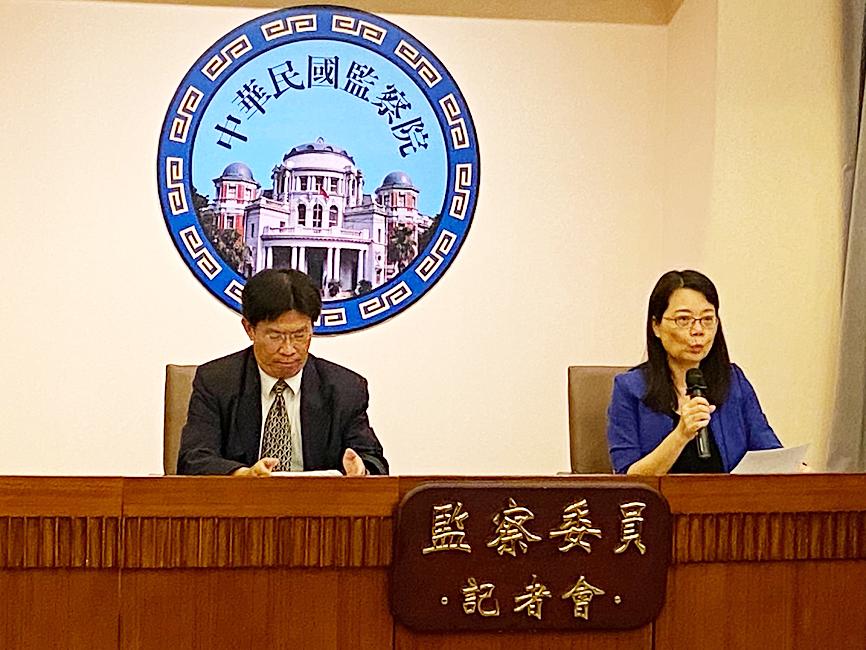The Control Yuan yesterday passed a motion to impeach former Commission on the Disciplinary Sanctions of Functionaries secretary-general Shih Mu-chin (石木欽) over alleged breaches of the Judges Act (法官法) and failing to avoid conflicts of interest.
The case began last year when Shih was accused of maintaining a friendship with Chia Her Industrial Co president Weng Mao-chung (翁茂鍾) after Weng was embroiled in legal disputes.
When Shih tendered his resignation last year, he became the commission’s first secretary-general to resign over accusations of moral misconduct.

Photo: Chung Li-hua, Taipei Times
The Control Yuan investigation said that Shih did not recuse himself when Weng appeared before the court and had allegedly provided Weng with legal advice on the side.
Shih, as a Supreme Court judge until 2017, also failed to recuse himself from the court’s cases involving Weng, despite their friendship, the investigation said.
Control Yuan member Wang Mei-yu (王美玉) said that Shih used his son’s name to purchase 10,000 shares in LandMark Optoelectronics, a company owned by Weng, for NT$11 per share, before selling the shares in 2014 for NT$300 and more per share after LandMark became a listed company.
Shih did not comport himself with the moral integrity expected of a Supreme Court judge and his actions failed to uphold the dignity of the judiciary, the Control Yuan said.
Yesterday, Shih said that past members failed to approve the investigation, while incumbent members ignored evidence advantageous for his case.
“The Control Yuan has brashly passed an impeachment based on imagined crimes,” Shih said, adding that the members ignored written law, which states that legal cases should cite the version of the law in effect at the time of the accusation.
Shih accused Control Yuan members of being “political hitmen” who impeached him solely for the sake of impeachment, saying that it was a sad thing to witness.

CAUTION: Based on intelligence from the nation’s security agencies, MOFA has cautioned Taiwanese travelers about heightened safety risks in China-friendly countries The Ministry of Foreign Affairs (MOFA) yesterday urged Taiwanese to be aware of their safety when traveling abroad, especially in countries that are friendly to China. China in June last year issued 22 guidelines that allow its courts to try in absentia and sentence to death so-called “diehard” Taiwanese independence activists, even though Chinese courts have no jurisdiction in Taiwan. Late last month, a senior Chinese official gave closed-door instructions to state security units to implement the guidelines in countries friendly to China, a government memo and a senior Taiwan security official said, based on information gathered by Taiwan’s intelligence agency. The

The National Immigration Agency (NIA) said yesterday that it will revoke the dependent-based residence permit of a Chinese social media influencer who reportedly “openly advocated for [China’s] unification through military force” with Taiwan. The Chinese national, identified by her surname Liu (劉), will have her residence permit revoked in accordance with Article 14 of the “Measures for the permission of family- based residence, long-term residence and settlement of people from the Mainland Area in the Taiwan Area,” the NIA said in a news release. The agency explained it received reports that Liu made “unifying Taiwan through military force” statements on her online

Taiwan Semiconductor Manufacturing Co (TSMC), the world’s largest contract chipmaker, said yesterday that it is looking to hire 8,000 people this year, at a time when the tech giant is expanding production capacity to maintain its lead over competitors. To attract talent, TSMC would launch a large-scale recruitment campaign on campuses across Taiwan, where a newly recruited engineer with a master’s degree could expect to receive an average salary of NT$2.2 million (US$60,912), which is much higher than the 2023 national average of NT$709,000 for those in the same category, according to government statistics. TSMC, which accounted for more than 60 percent

A magnitude 5.7 earthquake struck off Taitung County at 1:09pm today, the Central Weather Administration (CWA) said. The hypocenter was 53km northeast of Taitung County Hall at a depth of 12.5km, CWA data showed. The intensity of the quake, which gauges the actual effect of a seismic event, measured 4 in Taitung County and Hualien County on Taiwan's seven-tier intensity scale, the data showed. The quake had an intensity of 3 in Nantou County, Chiayi County, Yunlin County, Kaohsiung and Tainan, the data showed. There were no immediate reports of damage following the quake.